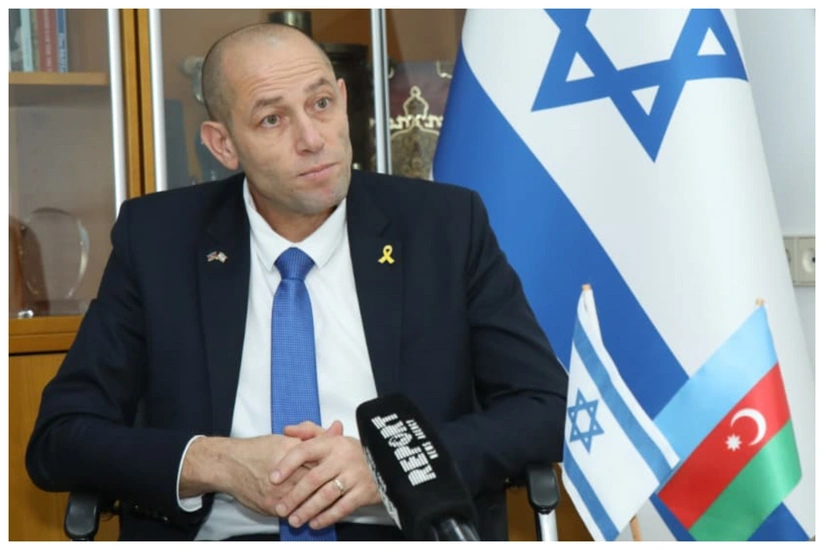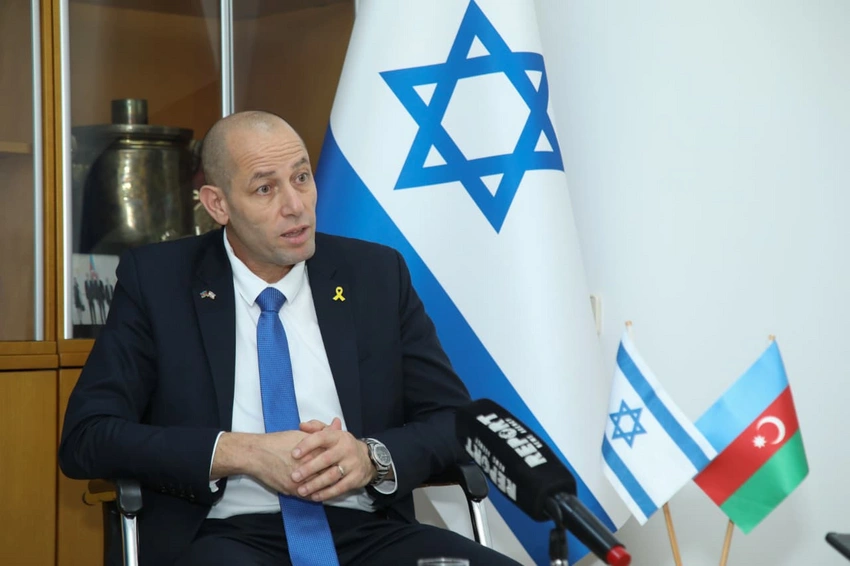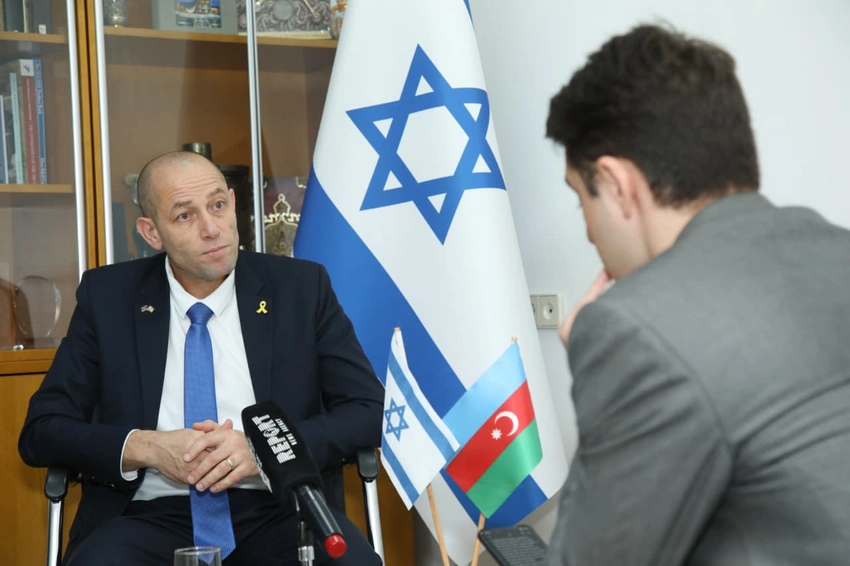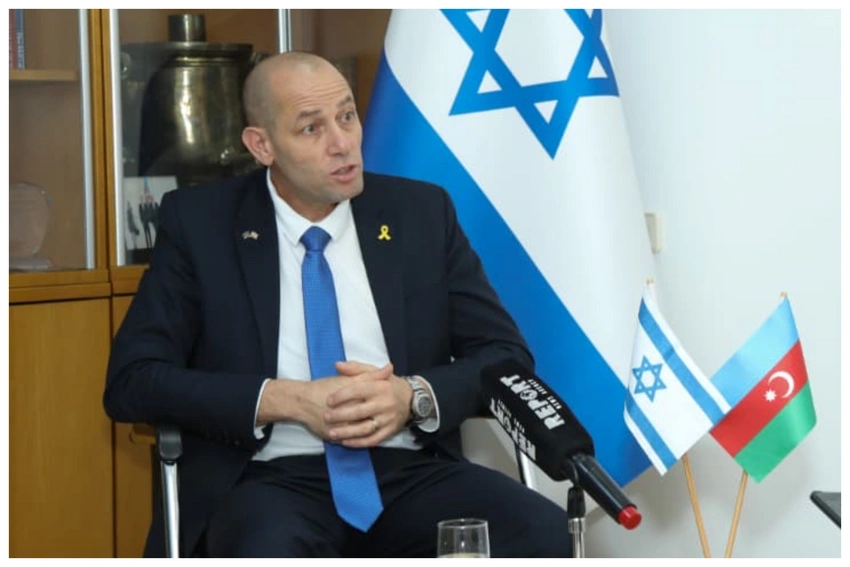Ronen Krausz: 'I'm optimistic about further deepening of Israel-Azerbaijan co-op' - INTERVIEW
- 05 September, 2025
- 12:07

Since the establishment of diplomatic relations in 1992, Azerbaijan and Israel have come a long way - from the first visits to a strategic partnership. Today, the interaction between the two countries covers a broad agenda - energy, agriculture, high technology, education, and security. In an exclusive interview with Report, the new ambassador of Israel to Azerbaijan, Ronen Krausz, discussed how relations have changed in recent years and what plans lie ahead for the countries.
- Azerbaijan and Israel have a long history of diplomatic relations that began in 1992. Israel was one of the first to open an embassy in Baku. How do you assess the current level of relations between our countries? And how has the opening of the Azerbaijani embassy in Israel in 2023 affected these ties?
- Our diplomatic relations began in 1992, and two years later an embassy was opened in Azerbaijan. Thus, it has been operating here for more than 30 years. During this time, contacts have significantly strengthened thanks to the efforts of many ambassadors and their deputies who worked tirelessly to develop and expand cooperation. In 2023, Azerbaijan opened its embassy in Tel Aviv - this was a significant achievement and an important contribution to bilateral relations. Since then, we have seen new steps: mutual visits, delegations, expansion of partnership in different sectors, and new areas of interest. I am confident that this direction will determine the future. I am extremely optimistic about further deepening cooperation.
- In which areas of cooperation have the countries achieved the greatest progress in recent years?
- We have traditional areas of partnership - defense and energy. In energy, we also observe strengthening interaction. We see the development of ties in other areas where Israel is a world leader: water technologies, agricultural innovations, cyberspace. Our cyber academy is successfully operating in Azerbaijan. Cooperation is also developing in healthcare, tourism, and other sectors, which, I am sure, will continue to expand. We are looking for new directions - for example, artificial intelligence. Since the relations between the leaders and peoples of the two countries are exceptionally strong, this opens up more and more opportunities for partnership.

- Israel and Azerbaijan also cooperate in international organizations. How does this affect regional stability in the Caucasus and the Middle East?
- I completely agree with the word you used - "stability." Political cooperation should lead to sustainability both in the region and on the world stage. The support that we have seen from both Azerbaijan and Israel in various structures and organizations has greatly contributed to the stability of both countries - both as independent states and as parts of their region. This is exactly how relationships are evaluated: how ready countries are to support and help each other when needed. I think Israel and Azerbaijan have already proven this.
- Security issues are relevant for both Azerbaijan and Israel. How do you assess the interaction between the two countries and what plans exist for its development?
- Cooperation in this area has been very successful so far, and I am confident that it will continue to remain so. But, as I mentioned earlier, relationships cannot be measured by one sector. They need to be viewed more broadly - in terms of economy, medicine, education, academic and scientific ties. Together, this strengthens the overall architecture of relations and shows the international community that they are truly strategic and important.
- Are there any high-level mutual visits and interdepartmental consultations planned for this year?
- We are working on organizing several high-level meetings and delegations. There are no exact dates yet, but preparations are actively underway. Personal contacts are of great importance: phone or online meetings are no longer enough. We need to sit at the same table, communicate directly, and this really helps create stronger ties. We hope that such meetings will take place before the end of the year.
- May I clarify, are we talking about visits at the highest level or at the ministerial level?
- We are considering all levels - from business delegations to the highest political level. As I already said, many areas still need development. And meetings of representatives of Israeli companies with Azerbaijani partners - both in Baku and in Israel - will contribute to this process.
- Israeli citizens receive an electronic visa to Azerbaijan for 30 days. Does Israel plan to simplify the visa regime for Azerbaijan or even introduce a visa-free format?
- Israel does not yet have such a mechanism, and this applies not only to Azerbaijan. But Azerbaijani citizens can apply to the embassy, and we try to issue visas as quickly as possible. As for the visa-free regime - during my work in Azerbaijan 15 years ago, I was glad to sign an agreement on visa-free entry for diplomats and holders of service passports. This became evidence of the closeness of our countries.

- In 2023, Azerbaijan and Israel signed a program of cooperation in the field of education. Are there plans for new projects?
- Education plays a key role. It is important to find platforms for joint projects in this area. I was pleased to visit the University of Languages, where an Israeli center operates, and meet with partners. Currently, students from Azerbaijan are studying in Israel, including seven people at the Golden Institute, where they deepen their knowledge of Hebrew and study the country. We hope to host delegations of students and professors from Israel in Azerbaijan.
- Does the embassy plan to open new Hebrew courses?
- We will support existing centers at the University of Languages and Baku State University, where Hebrew is taught and Israel is studied. In addition, we are looking for new opportunities for exchanges: so that Azerbaijani students gain experience not only in language learning but also in other areas of education.
- When will the next meeting of the Intergovernmental Commission take place?
- This is a key mechanism for developing economic ties. We are actively preparing for the next meeting and at the same time working on preliminary contacts between ministries. I hope the meeting will take place in the near future and strengthen the foundation for further cooperation.
- How can Israel and Azerbaijan cooperate in renewable energy?
- Green energy is one of the most important areas, especially in the context of climate change. Israel has strong technologies in solar energy, and we are ready to share them with Azerbaijan. I remember a large Israeli delegation at COP29 in Baku: both energy and water supply were discussed. Here, Israel can offer a significant contribution.

- Which sectors of Azerbaijan's economy are most interesting for Israel?
- First of all, water technologies. Israel has become a world leader in this field, as desert conditions forced us to look for effective solutions to water scarcity. These technologies help in agriculture and food security. Medicine, cybersecurity, artificial intelligence, and financial protection are also important. Israel is ready to share experience and opportunities with Azerbaijan.
- How do you assess the situation in the Middle East after the escalation with Iran in June and the negotiations with Syria that took place in Baku?
- As for Iran, the June campaign - the 12-day war - was imposed on us. Israel does not seek wars, we are peace-loving and want to live in peace with our neighbors. But when we became a target, we had to act. Let me remind you: Iran has openly declared its desire to destroy Israel, we have seen this in their statements and symbols. They support Hezbollah, the Houthis, as well as Hamas, which started the war on October 7. Until now, 48 of our citizens are being held hostage. As long as Iran supports such actions, we will defend ourselves. If they stop - we will stop too. We don't want an unnecessary war. As for the negotiations with Syria in Baku - we are grateful to Azerbaijan for providing the platform. These negotiations gave hope for peace. The only way is dialogue and cooperation. If it is constructive, I am optimistic about the results.
